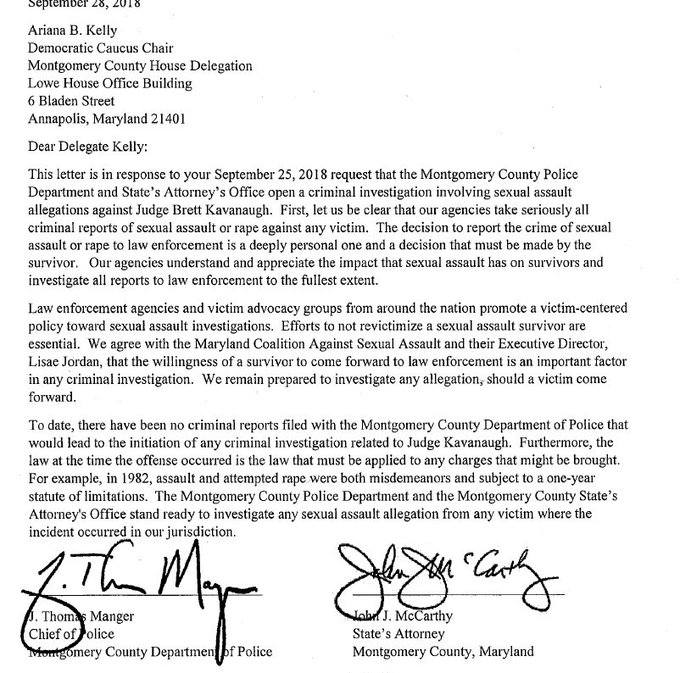
Could Brett Kavanaugh still be charged with a crime as a result of the accusations by Dr. Christine Blasey Ford against him? The answer to that question is fairly complex, as it would revolve around a series of determinations by a prosecutor. That would be a decision grounded in the laws that existed at the time.
However, a Maryland criminal defense attorney who also worked as a prosecutor, told Heavy in a detailed interview that he didn’t think the allegations – as described thus far – would rise to the level needed to get past Maryland’s statute of limitations. Indeed, Randolph Rice, a defense attorney based in Baltimore, told Heavy in an interview that, if a prosecutor did bring charges, the problems in the case would be a “field day” for a defense attorney.
The Montgomery County police chief and State’s Attorney said that any charges would have to reflect the laws in place at the time – and they say that, in 1982, assault and attempted rape were misdemeanors subjected to one-year statute of limitations.
Rice said he believed Ford’s accusations would most closely fit a fourth-degree sexual offense under the law, which would be a misdemeanor in Maryland and thus past the statute of limitations and something that could no longer be charged. “I don’t see any way it’s any of the felonies. At best I think it’s fourth degree sex offense,” Rice said (and that determination would depend on a prosecutor going forward despite other hurdles in the case). Rice created his criminal defense law firm in 2009; before that, he worked with the “Baltimore County State’s Attorney’s office as an Assistant State’s Attorney,” his bio says.

Randolph Rice
However, what is the statute of limitations in Maryland for different sexual assault/offenses?
Here’s what you need to know:
The Statute of Limitations Varies Depending on the Level of Offense

GettyPresident Donald Trump, Judge Brett M. Kavanaugh, his wife Ashley Estes Kavanaugh and their daughters, Margaret and Liza, share a laugh.
The accusation in the Ford/Kavanaugh case is 36-years-old and dates to when Kavanaugh was 17, a juvenile. Blasey Ford – who was publicly testifying about the allegations before the Senate Judiciary Committee on September 27, 2018 – has alleged that Kavanaugh groped her while putting his hand over her mouth at a house party in the 1980s. She then escaped. Kavanaugh adamantly denies the accusations, and three other people Ford has said were at the party have denied any recollection of it (which would seem to present a serious evidentiary problem for any prosecutor considering charging). Three friends and Ford’s husband have submitted affidavits to the Senate saying that Ford told them about the alleged attack before President Donald Trump nominated Kavanaugh to the Supreme Court. Blasey Ford has said there are things she can’t remember – such as exactly when and where the alleged attack occurred – which could also present prosecutorial hurdles (and, as of now, no prosecutor has indicated they are considering lodging charges.) Ford’s attorney says she passed a polygraph test and Ford says she told a therapist about the alleged attack several years ago, although the therapist’s notes don’t mention Kavanaugh’s name.
All of these details could matter when it comes to the statute of limitations – again, were anyone to attempt to bring criminal charges, that is (and no one has said they are, at least at this point.)
According to Legal Match, “In Maryland, the criminal statute of limitations varies depending on the severity of the offense. The criminal statutes of limitations include: Felony sexual offenses: no statute of limitations, and Misdemeanor offenses: one year from the event.”
In the interview, attorney Rice confirmed this was accurate: In Maryland, there is no statute of limitations for felony sexual offenses, but there is a statute of limitations for misdemeanors, so if the case were considered the latter, it couldn’t be charged because Blasey Ford is alleging it happened 36 years ago.

Christine Blasey Ford’s campaign donations are to Democrats.
“There is no statute of limitations for felonies,” Rice said. “There is a statute of limitations of misdemeanors, which is one year.” Asked whether it would matter what the statute of limitations was at the time of the offense, as opposed to now, Rice said, “I’m not familiar with any different laws 36 years ago that would change this. I think what the state would ultimately look at is whether this is a misdemeanor or a felony. Which statute does this really fall under?”
Maryland statutes basically break down such crimes into different categories of rape and sexual offenses. The rape statutes, though, “require some sort of vaginal intercourse,” said Rice, which isn’t alleged here. Attempted rape would require “some substantial step toward” vaginal intercourse, he said.
“There’s no allegation of that in what they’ve said before, so I discount those as being considered,” he said, moving on to the four gradations of sexual offense in Maryland statutes.
He said the sexual offense category has gradations running from first to fourth degree, with the most serious also qualifying as felonies. However, Rice said that the most serious gradations all involve things that he doesn’t see present in the allegations, like use of a weapon, suffocation, oral sex, and so on. Asked whether Ford’s accusation that Kavanaugh allegedly put his hand over Ford’s mouth to keep her quiet could be considered suffocation for purposes of a felony charge, Rice paused in contemplation but then said he didn’t think it would rise to that.
“From what we know now seems like a stretch to charge a felony. It appears the force is so minimal it doesn’t rise to any of the felonies,” Rice said. “…There could be an argument I guess for an aggressive prosecutor.” Although being aided and abetted by another person can increase the gradation and Ford alleges Kavanaugh’s friend Mark Judge was in the room, Rice said, “It doesn’t seem from the allegation that Judge was involved in anyway; he merely interrupted it.”
Ultimately, Rice concluded that he believes the accusations would most likely rise to the level of a misdemeanor. “I don’t think he can be charged,” he said of the Blasey Ford accusation. “Given the facts we have now, nothing has been said up to this date” that would “allow for a charge without any statute of limitations.”
If Kavanaugh were charged, there are multiple avenues a defense attorney could take to defend him, Rice said, among them the delayed reporting, the timing of the accusation with his Supreme Court nomination, and any inconsistencies between what she’s said in interviews and her letter and therapist’s notes.
Despite the fact Kavanaugh was 17 when Blasey Ford alleges he attacked her, Rice believes he would be charged as an adult (if he were ever charged at all). But he added: “I am sure if he was charged, I would certainly try to find a loophole to get it put back into the juvenile court system.”
RAINN.org says the “the state has eliminated the statute of limitations for all felony sex crimes” and whether the accuser reported the allegation at the time does not affect the statute of limitations. Maryland’s current laws treat juveniles different than adults if they are under age 18 at the time of the offense. Blasey Ford has not been clear on where the alleged attack exactly occurred, although she says it was in Montgomery County, Maryland.
Kavanaugh has also been accused of sexual misconduct by two other women who are named; he denies all of those accusations. One, Deborah Ramirez, has alleged misconduct that she says occurred when they were in college in Yale, which is in Connecticut, not Maryland. The other Julie Swetnick has accused Kavanaugh and his friend of being involved in parties where there were gang rapes, which they have both denied. The above analysis is limited to the Blasey Ford accusation.
